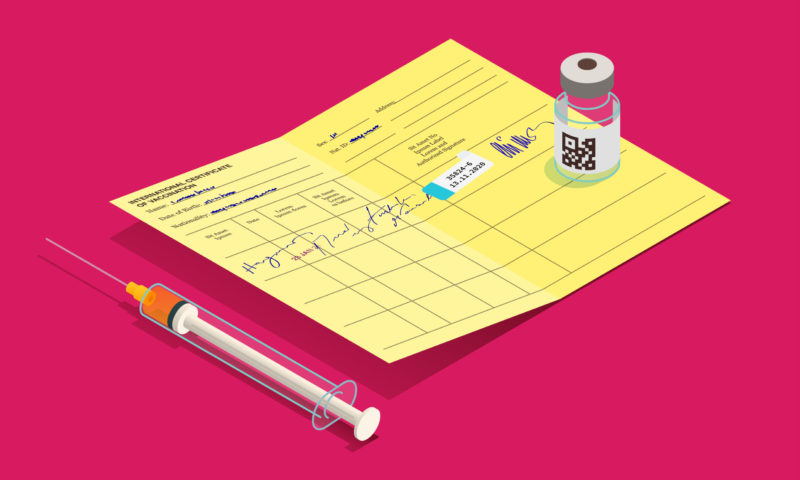Learn more about our FREE COVID-19 Patient Support Program for chronic illness patients and their loved ones.
Since the COVID-19 vaccines were first administered in December 2020, many people with rheumatoid arthritis and other rheumatic diseases have wondered if getting the shot could cause a disease flare. This is a valid concern given how debilitating some flares can be, as well as unknowns about how vaccinations affect the immune system in people with inflammatory or autoimmune conditions.
New data, however, shows that adverse events like flares are rare and mild in rheumatic disease patients who received a COVID-19 vaccine. The research was based on data from the European Alliance of Associations for Rheumatology (EULAR)-COVID-19 Registry and recently presented at the EULAR 2021 Virtual Congress.
Researchers collected data from 1,519 patients from February 5, 2021 to April 27, 2021. They found that disease flares were reported by 5 percent of patients with inflammatory rheumatic and musculoskeletal diseases (RMDs), with just 1.2 percent classified as severe flares. The average time between the vaccination date and an inflammatory RMD flare was five days.
This means that 95 percent of patients with inflammatory rheumatic and musculoskeletal diseases did not report experiencing a flare after the COVID-19 vaccine.
The most common flare symptoms were arthritis (2.5 percent), arthralgia (2.1 percent), cutaneous flare (0.8 percent), and increase in fatigue (0.8 percent).
“The safety profiles for COVID-19 vaccines in RMD patients was reassuring,” write the researchers. “Most adverse events were the same as in the general population, they were non-serious, and involved short term local and systemic symptoms.”
Researchers also noted that “the overwhelming majority of patients tolerated their vaccination well.”
A little over 30 percent of patients reported potential vaccine side effects, most of which were typical early adverse events within a week of vaccination — such as pain at the site of injection and headache. These side effects typically occurred within seven days of vaccination.
While organ system adverse events were reported by 2 percent of patients, only 0.1 percent reported severe adverse events. For instance, there was one case of hemiparesis — muscle weakness or partial paralysis — in a patient with systemic sclerosis/SLE overlap syndrome (which was ongoing at the time of reporting) and giant cell arteritis in a patient with osteoarthritis (who recovered).
There was also one case of mild cardiac arrhythmia (which resolved), one case of moderate arthritis (with an unknown outcome), two cases of liver injury (one mild and one moderate, with one resolving), and a single case of mild anosmia/ageusia (loss of smell and taste, which resolved), reports MedPage Today.
Of the 1,519 patients in the study, 68 percent were female. The average age among the group was 63 years old. Here is the breakdown of the patients’ rheumatic and musculoskeletal diseases:
- 91% of patients had inflammatory RMDs
- 51% had inflammatory joint disease
- 19% had connective tissue diseases
- 16% had vasculitis
- 4% had other immune mediated inflammatory diseases
- 9% of patients had non-inflammatory/mechanical RMDs
- 30% of patients had rheumatoid arthritis
- 8% of patients had axial spondyloarthritis
- 8% of patients had psoriatic arthritis
- 7% of patients had systemic lupus erythematosus (SLE)
- 6% of patients had polymyalgia rheumatica
When it came to rheumatic disease treatments, 81 percent of people were taking synthetic or biologic DMARDs, the most common of which were methotrexate (29 percent), TNF inhibitors (18 percent), antimalarials (10 percent), and rituximab (6 percent).
Most of the vaccines administered were Pfizer (78 percent), followed by AstraZeneca (16 percent), Moderna (5 percent) and other/unknown (1 percent).
This data illustrates what many experts have suspected since the beginning of the pandemic: The chances of the COVID-19 vaccine resulting in disease flares are small.
“These initial findings should provide reassurance to rheumatologists and vaccine recipients, and promote confidence in COVID-19 vaccine safety in RMD patients, namely those with inflammatory RMDs and/or taking treatments that influence their immune system,” write the researchers.
Rheumatologists and public health officials urge patients to get the COVID-19 vaccine and to encourage friends and family to do so, as this will further protect them.
Get Free Coronavirus Support for Chronic Illness Patients
Join the Global Healthy Living Foundation’s free COVID-19 Support Program for chronic illness patients and their families. We will be providing updated information, community support, and other resources tailored specifically to your health and safety. Join now.
Machado PM, et al. COVID-19 Vaccine Safety in Patients with Rheumatic and Musculoskeletal Disease. Annals of the Rheumatic Diseases. Volume 80, Supplement 1. 2021. http://scientific.sparx-ip.net/archiveeular/?view=4&searchfor=machado&c=a&item=2021LB0002.
Walsh N. COVID Vaccine Safe in Rheumatic Patients. MedPage Today. June 6, 2021. https://www.medpagetoday.com/meetingcoverage/eular/92952.






